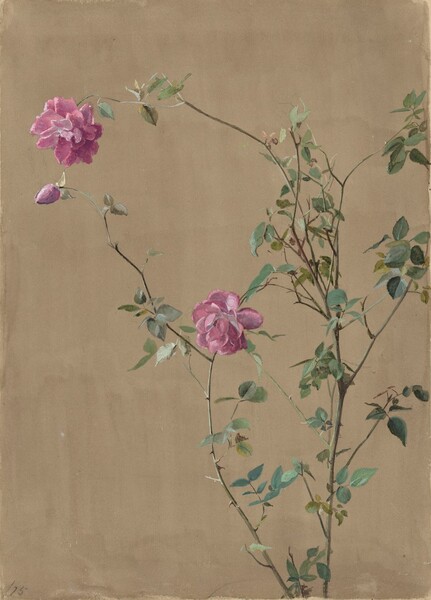A City Garden
By William Stanley Braithwhite
Annotations by Rene Marzuk

Hid in a close and lowly nook,
In a city yard where no grass grows—
Wherein nor sun, nor stars may look
Full faced—are planted three short rows
Of pansies, geraniums, and a rose.
A little girl with quiet, wide eyes,
Slender figured, in tattered gown,
Whose pallored face no country skies
Have quickened to a healthy brown,
Made this garden in the barren town.
Poor little flowers, your life is hard;
No sun, nor wind, nor evening dew.
Poor little maid, whose city yard
Is a world of happy dreams to you—
God grant some day your dreams come true.
BRAITHWHITE, WILLIAM STANLEY. “A CITY GARDEN,” IN THE DUNBAR SPEAKER AND ENTERTAINER, ED. ALICE MOORE DUNBAR-NELSON, 28. NAPERVILLE, ILL: J. L. NICHOLS & CO., 1920.
Contexts
The Dunbar Speaker and Entertainer‘s dedication reads: “To the children of the race which is herein celebrated, this book is dedicated, that they may read and learn about their own people.” In the foreword, Leslie Pinckney Hill, an African American educator, writer, and community leader who graduated from Harvard University in 1903, criticizes the one-sidedness of prevailing reading courses: “In vain may you search their pages—those pages upon which all our reading has been founded—for anything other than a patronizing view of that vast, brooding world of colored folk—yellow, black and brown—which comprises by far the largest portion of the human family.” Hill further writes that Alice Dunbar-Nelson’s book seeks to prove “that the white man has no fine quality, either by heart or mind, which is not shared by his black brother.”
Think of reading this poem out loud. Elocution (or public speaking) was a highly valued and widely taught skill in nineteenth-century America. In her introduction to the Dunbar Speaker, Alice Dunbar-Nelson offers some advice: “Before you begin to learn anything to recite, first read it over and find out if it fires you with enthusiasm. If it does, make it a part of yourself, put yourself in the place of the speaker whose words you are memorizing, get on fire with the thought, the sentiment, the emotion-then throw yourself into it in your endeavor to make others feel as you feel, see as you see, understand what you understand. Lose yourself, free yourself from physical consciousness, forget that those in front of you are a part of an audience, think of them as some persons whom you must make understand what is thrilling you–and you will be a great speaker.”
Before appearing in The Dunbar Speaker and Entertainer, “A City Garden” was included in Braithwhite’s Lyrics of Life and Love (1904), fully available on Google Books.
Definitions from Oxford English Dictionary:
pallor: Paleness or pallidness, especially of the face.
tattered: Clad in jagged or slashed garments.
Resources for Further Study
- In the early 1900s, Americans started to concentrate in cities, lured by the promise of better jobs and higher wages. However, the lives those who worked in the city factories (mainly former rural families and immigrants) was harsh. The Library of Congress offers information on American cities during the Progressive Era (1896-1920).
- Smithsonian Gardens offers a comprehensive timeline of American Garden History.